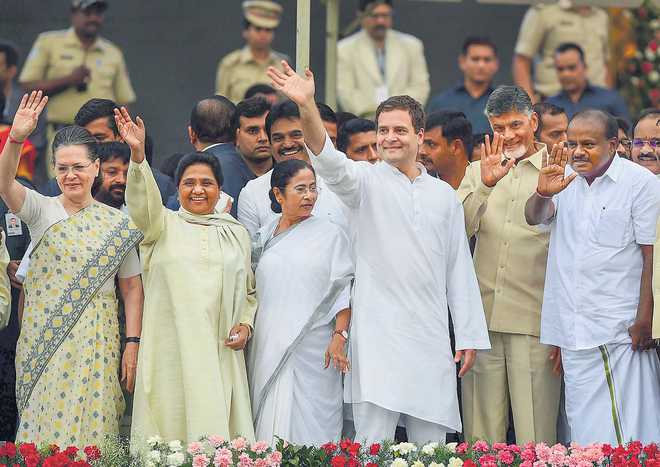
Some of them could contest against each other.
Nilanjan Mukhopadhyay
Senior political analyst
THE West Bengal unit of the Congress party has pushed for alliance with the Left parties as part of efforts to form a political front of non-Trinamool Congress and non-BJP political outfits. The proposed understanding is to extend beyond electoral understanding or seat adjustment, instead being more programmatic in character involving joint action and aimed not just at 2019 elections, but also the 2021 Assembly polls.
Mamata Banerjee, who made the “one is to one” pitch several weeks ago would not be pleased at her proposition being turned down in her own lair.
The proposal for a third front in West Bengal firstly, underscores the emergence of the BJP as a dominant pole in the state. Secondly, it also demonstrates that Indian political reality is anything but linear. However much the BJP and Modi on the one hand, and several opposition leaders on the other, argue that 2019 will witness a straight contest, such a scenario is an impossibility. Indian politics is far too complex and has historically compelled power sharing between various territories and social groups for it to be reduced into a one-to-one contest at the national level.
While this may be somewhat feasible in bipolar states, in large parts of India, linear delineation is neither possible nor desirable. Despite being aware of this, both sides are projecting such a spectre because it suits them. The BJP aims at discrediting challengers by raising the “Modi versus who” question. On the other hand, opposition parties are giving wind to the sentiment that opposition parties are coming together because this can unnerve the BJP cadre and convey to people that Modi is not invincible.
Yet, there is no gainsaying that the Index of Opposition Unity will be greater in 2019 than in 2014. The process has progressed considerably and opposition unity has made headway not just in UP, but in other states too. It is already in existence in Bihar where there is no knowing when the mahagathbandhan will have to make space for more allies, and Maharashtra.
Moreover, as events in Kairana demonstrated, the pact is expandable and can include other regional parties with localised strongholds and that the BJP can be worsted even when it raises its stakes. Additionally, UP voters elected the first Muslim to the Lok Sabha since 2014 and from a constituency at the centre of past communal conflict. It suggests that this phase of polarisation has run its course and unless the BJP successfully whips up frenzy anew, it will be tough to repeat either 2014 or 2017.
In recent weeks, the Sangh Parivar has stepped up internal consultative process. This makes it evident that the BJP considers that higher IoUs can be surmounted by ironing disagreements within its Hindu United Family. But, this is a bit of a Catch-22 situation: greater and more cohesive backing of the saffron-fold carries the risk of putting off NDA allies. As the recent outreach makes obvious, the BJP under this regime does not treat allies with respect when it is politically ascendant.
The BJP’s nightmare scenario is the absence of a single overarching national sentiment and people voting as they do in state elections. Already, the party is handicapped by the cadre sensing that the predetermination of 2014 is missing and weight of failed expectation may slow down the charge. This presents the best possible opportunity for opposition parties to seriously challenge the BJP and present alternatives in governance and political partnerships.
If opposition parties build alliances in states differently, they can convey to people that right from the first election India was a coalition, the difference being while previously various interest groups coexisted under the Congress umbrella, many have now floated individual parties. India is pluralistic not just from the religio-cultural framework, but also because of layered engagements and transactions between various socio-political interest groups. There is thus no necessity to replicate the UP model, for instance, in every state. Between 1962-64 Deendayal Upadhyaya and Ram Manohar Lohia agreed on issues as varied as seeking US assistance to formation of an Indo-Pak confederation while disagreeing on nationalism. The Jan Sangh and socialists forged alliances and formed coalitions to oust the Congress. There are numerous instances where post-poll allies were not necessarily pre-election partners although pre-poll pacts are weighed when the President or Governor takes a call on who to provide the first opportunity to form a government.
Opposition parties will have to find ways to circumvent situations in several states where non-BJP parties are mutual adversaries too. In West Bengal for instance, the Left and the AITC cannot partner. The scenario in Odisha too poses a challenge. There is also a fault line in the WBPCC’s proposal as in Kerala the Congress and Left parties are principal contenders. The BJP is upfront regarding its vision of a unitary nation and its slogan “one-people, one-culture, one nation” and makes no pretention of being a coalition. It will run down opposition parties’ efforts to forge alliances by describing it as khichdi. The task for BJP’s adversaries is simple: convince people that such a ‘broth’ is wholesome and good for the nation’s health as against being fed with the same diet the day in and the day out.



























